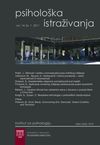Profesionalne brige budućih i aktuelnih nastavnika
Professional Concerns of Pre-Service and in-Service Teachers
Author(s): Nataša SimićSubject(s): Education, Psychology
Published by: Филозофски факултет, Универзитет у Београду
Keywords: teachers; concerns; grounded theory; qualitative content analysis;
Summary/Abstract: The main goal of this paper was to determine the professional concerns of preservice and in-service teachers. Professional concerns were defined as topics which are of teachers’ interest that result in positive or negative feelings and endeavours to understand and/or resolve them. I relied on Fuller’s developmental model of teachers’ concerns, according to which beginners have Self-concerns, whereas Task concerns and Influence concerns become more frequent over time. Research participants were nineteen students of the third and fourth year at the “teacher” faculties and 22 subject teachers who have worked at primary schools for more than five years, who were interviewed. Their answers were analysed using the combination of the grounded theory, asdefined by Charmaz, and qualitative content analysis, more specifically, thematic analysis, according to Mayring. The analysis of students’ answers revealed 11 subcategories of the category labelled as Beginner concerns: Survival, Efficacious teaching methods, Identity and meaning, Classroom climate, Colleagues, Assessment, Students’ behaviour, Classroom diversity, Parents, Expert authority, and “Technical” issues. The analysis of teachers’ answers yielded nine subcategories of the category Veteran concerns– the same as for students, except for Survival, Assessment and Expert authority, with one new category – Attitude towards teachers and education. On the one hand, the obtained results have confirmed Fuller’s thesis that Self-concerns are dominant at the beginning of teachers’ career, but,on the other, they have invalidated it at the same time since it was determined that even students had Influence concerns. The differences between pre-service and in-service teachers were interpreted in the light of the latest educational reforms and changes in value orientations in the Serbian society. The concluding part outlines the recommendations for teacher educators.
Journal: Psihološka istraživanja
- Issue Year: 18/2015
- Issue No: 1
- Page Range: 47-62
- Page Count: 16
- Language: Serbian

